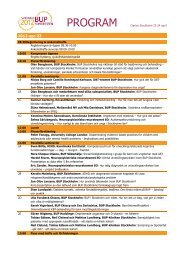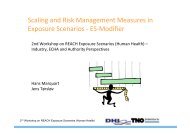Clusters are individuals - VDI/VDE-IT
Clusters are individuals - VDI/VDE-IT
Clusters are individuals - VDI/VDE-IT
You also want an ePaper? Increase the reach of your titles
YUMPU automatically turns print PDFs into web optimized ePapers that Google loves.
4. POLICY RECOMMENDATIONS<br />
<strong>Clusters</strong> <strong>are</strong> <strong>individuals</strong> who need individual support for sustainable<br />
growth and enhanced competitiveness in order to<br />
become world-class clusters that maintain and extend the<br />
global competitiveness of the European Union’s economy –<br />
that is the most important conclusion from the benchmarking<br />
of 143 cluster management organizations from Austria,<br />
Denmark, Finland, Germany, Iceland, Norway, Poland and<br />
Sweden.<br />
Support of cluster development by means of cluster programs<br />
should therefore be more than just providing grants<br />
for office and staff funding of cluster management organizations.<br />
It is also about providing tailor-made technical assistance<br />
for cluster management organizations in order to<br />
support their efforts with the provision of needs-driven and<br />
value-adding products and services for the cluster members.<br />
And it is also about developing favorable framework<br />
conditions in which clusters can flourish through the coordination<br />
of cluster policies and programs with other relevant<br />
policy <strong>are</strong>as and programs. Last, but not least: cluster programs<br />
should focus on the support of cluster management<br />
excellence. Only cluster management organizations that <strong>are</strong><br />
excellently managed can develop and offer the support to<br />
cluster members that they need to maintain and to extend<br />
their global competitiveness.<br />
The results of the benchmarking of 16 cluster programs<br />
from Denmark, Finland, France, Germany, Greece, Iceland,<br />
Norway, Poland and Sweden demonstrate that there <strong>are</strong><br />
many good cluster programs in the Member States of the<br />
European Union. All these programs support the above<br />
briefly sketched objectives forward looking cluster programs<br />
should have. However, there is room for improvement. In order<br />
to improve their effectiveness and efficiency these programs<br />
can both learn from each other from the results of the<br />
cluster program benchmarking and from the results of the<br />
cluster benchmarking. Certainly, these results provide also<br />
inspiration for many other cluster programs that have not<br />
participated in the NGPExcellence project.<br />
The following eight policy recommendations <strong>are</strong> based on<br />
the findings of the cluster and cluster program benchmarking.<br />
They provide guidance for future developments of cluster<br />
programs and shall contribute to the evolution of outstanding<br />
“world class” clusters that <strong>are</strong> driven by excellent<br />
cluster management organizations:<br />
1. Improve coordination of cluster programs and other<br />
relevant funding programs. Ideally there should be<br />
only a limited number of coordinated cluster programs<br />
that target different types of clusters. With a limited<br />
number of cluster programs that support the establishment<br />
of cluster management organizations at the core of<br />
an overall cluster development strategy additional individual<br />
R&D/innovation, business development and infrastructure<br />
(e.g. in the educational sector) programs can address<br />
the specific needs of the different actors within a cluster. In<br />
this regard program strategies, instruments, time frames<br />
and target groups of programs should be coordinated and<br />
efforts should be made to limit administrative burdens for<br />
applicants as much as possible. Programs should also be<br />
aligned with policies that pursue an improvement of the<br />
framework conditions which have an impact on the development<br />
of a cluster (e.g. educational or labor policies). ..........<br />
2. Tailor-made assistance for clusters should have a high<br />
relevance in the program strategy. The economic impact<br />
of a cluster depends not only on its size and maturity.<br />
It is also the technology domain of the cluster that<br />
matters in terms of the structure, the governance and<br />
the performance of a cluster. Cluster programs therefore<br />
should take the different framework conditions of industries<br />
and technology domains into account through<br />
assistance that is tailor-made according to the specific<br />
needs of a cluster.. r .<br />
3. Programs should put emphasis on cluster management<br />
excellence. Cluster support is not about the mere establishment<br />
of clusters, but about developing excellently managed<br />
clusters that <strong>are</strong> internationally competitive and that<br />
have an impact on the national economy. Thus, cluster support<br />
should focus on cluster excellence and depend on the<br />
performance of the cluster. Apart from grant funding of cluster<br />
organisations it is very important that the support also<br />
focus on targeted, need-focused services such as relevant<br />
workshops and seminars, benchmarking as well as a continuous<br />
strategic dialogue to question and further develop<br />
strategies and activities. Labeling of excellent cluster managements<br />
is another important aspect in this context; not<br />
only because it creates more visibility for a cluster, but also<br />
because it encourages cluster managements to provide excellent<br />
management in order to earn and preserve the label..<br />
–<br />
4. Cluster programs should develop world-class clusters<br />
in industry sectors that <strong>are</strong> internationally competitive.<br />
Without limiting the attention to the development<br />
of clusters for the purpose of regional economic development,<br />
there should also be programs that support the development<br />
of clusters that <strong>are</strong> internationally competitive.<br />
The support should focus on those industries in which<br />
a country’s economy shows pronounced comparative<br />
advantages on the global market. Cluster management<br />
excellence should be a key priority of such programs.<br />
58

















